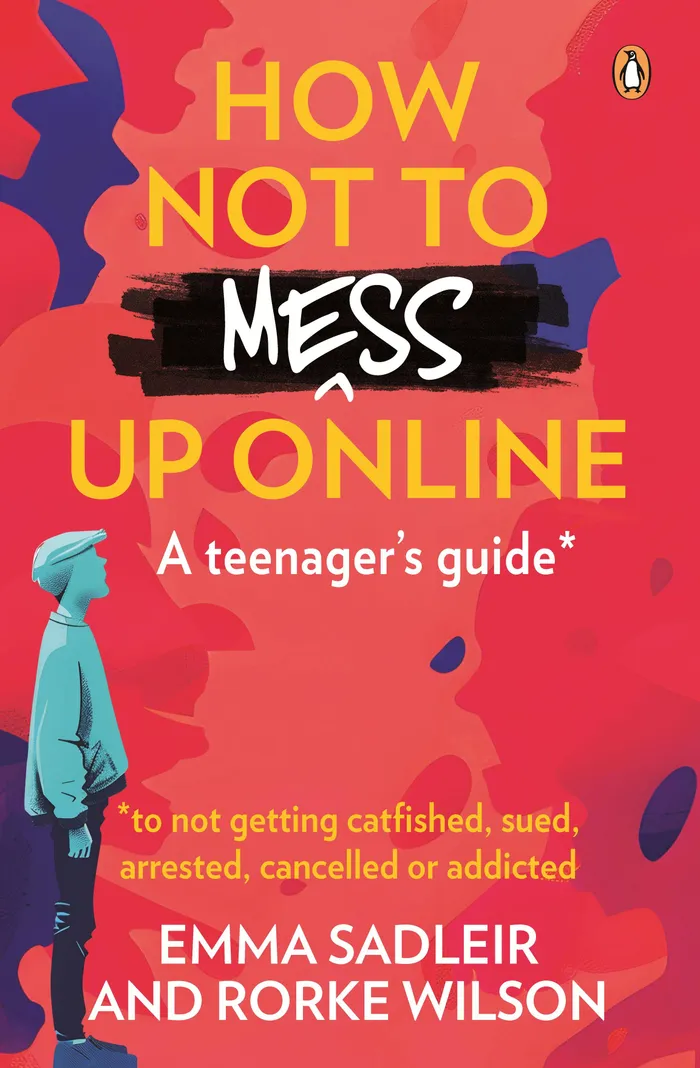Think once. Think twice, and think again before you post
Social Media dangers

Social media lawyer Emma Sandleir has written a book on how to stay out of trouble.
Image: Supplied
How Not to Mess Up Online by Emma Sadleir and Rorke Wilson is the book every teen, parent, influencer - indeed, every user - needs in a world where the internet doesn’t come with training wheels.
From AI and deepfakes to sextortion and screenshot scandals, today’s digital dangers move fast - and the law’s still catching up. That’s where this book comes in. Sadleir is a leading digital law expert. Wilson is a Gen Z with receipts. Together, they break down the legal, emotional and reputational risks of being online - without preaching or sugarcoating it. Packed with real South African case studies, chaotic cautionary tales and clear legal advice, this guide covers everything from sexting and cyberbullying to scams, plagiarism, privacy and AI-generated nonsense. It’s not about scaring you off the internet – it’s about showing you how to use it without it using you.
Sadleir is Africa’s leading expert on social media law and founder of the Digital Law Company. A frequent commentator in the media, she is the first person people call when something goes wrong online. Now that Emma has her own children, she has a personal interest in making the digital world safer. Wilson, an associate at the DLC with an LLB (Hons) from Edinburgh University, brings Gen-Z insight and a passion for helping young people stay safer and smarter online than their own generation ever was. Sadleir rides horses, loves cricket and has a penchant for a party. Wilson also likes riding, hates cricket and doesn’t know what penchant means but also loves parties.
How Not to Mess Up Online is published by Penguin Random House with a recommended retail price of R280.

A book all teens - and their parents - should read.
Image: Supplied
THE FACTS
Emma has one rule for the internet that she shares with anyone who happens to be listening, and sometimes even with those who aren’t. Ten years ago, it was “think before you post something”. Then the screenshot happened, and the rule became “think a lot before you post or send something”. Then her career continued to happen, and she saw every way the internet can ruin a person’s life, and now she tells us: don’t let digital content exist if you wouldn’t put it on a ginormous billboard in your neighbourhood. Imagine that billboard displaying the content, your name/handle/username, the name of your school and a HUGE photo of you in your school uniform.
Why so strict? Well, let’s dive into the horror stories …
If you post it
The dangers of the internet are easy to remember, because they’re the same as its upsides. It’s easy to be seen by everyone, and information travels superfast. If it’s online, it can be found, downloaded, screenshotted, copied and pasted (don’t believe us? There’s a website whose entire purpose is to archive the rest of the internet: https://archive.org/). Your content is also stored (and backed up a few times) by the platforms, who can do whatever they want with it. Most social media sites claim that they keep all content on the back end for ten years, but we’re not sure they ever even try to delete it after those years have elapsed. It’s not safe, foolproof, a good idea, or whatever other synonym for “don’t do it” we can come up with.
If you send it
If you send something to someone you know and trust (i.e. you text or DM them), that person becomes a risk to your content and, by extension, YOU. You might not think of that person as a risk, but any person who receives content from you could become the source of a “leak”. You might think that you can trust that person because they’re your BFF, but how good are you at keeping secrets? There’s always one person you tell, and that person has one person they have to tell … and then the whole school knows.
And what if you have a falling-out with that BFF? Or maybe you get a new BFF that your old BFF doesn’t like, and your old BFF gets angry enough to share the bitchy DMs you sent her a few months ago with your new friend? Also, we hate to tell you this, but at your age you are not statistically likely to marry your current romantic partner. We’re not saying that this relationship isn’t important to you now, but we are saying think twice before you send the nudes. Your partner might just think they’ll get some clout by showing your pics to their friends.
Emma was once asked to help a girl who was expelled just days before her matric exams. Her “friend” had taken a screenshot of an inappropriate comment this girl had made to her on WhatsApp and then sent it to the CLASS WhatsApp group. There was nothing we could do to help her. She had said the thing – and once it’s in the digital space, it’s out there.
Even if you are sending something to someone who truly has your best interests at heart all the time, like your mom, your mom’s phone could get stolen or hacked, making all that content freely available to the thief. Or your mom’s cloud storage could get hacked, or someone could take a screenshot and send it … The possibilities are endless.

Actress Jennifer Lawrence learned the hard way how naked photographs can get online. Even though she killed them moments after taking them.
Image: AFP
And if you don’t send it
Remember how we mentioned that your mom’s cloud storage isn’t safe? It’s not just a “your mom” problem, it’s an “everyone” problem. In 2014, there was this thing called “The Fappening”, where the nudes of nearly 100 people, including A-list celebs like Jennifer Lawrence, were leaked online (to the parents reading this, we hope your content settings are set to “safe”, because the mere mention of this will send pubescent fingers running to keyboards). The worst part of “The Fappening” was that these celebrities had not sent these photos to anyone. They had taken them for their own enjoyment. Maybe they were feeling body confident after a shower or sharing a beautiful, intimate moment with their partner that they wanted to remember.
In Jennifer Lawrence’s case (a confident moment), the photos existed on her phone for only a minute before she decided she didn’t feel so confident after all and deleted them. But it was too late: they were already backed up, which meant that even when Jennifer didn’t have them on her phone, hackers could still access them and share them with the world. Which they did. Over five years after she had taken and immediately deleted them. Poor Jennifer.
Cloud storage aside, dodgy people can still get hold of unsent content by just taking your phone. Emma was once asked to speak at a school that was experiencing a theft of around 12 phones a week. The real kicker was that the phones weren’t being stolen to be wiped and resold, they were being stolen so that content (photos, messages, videos, voice notes, browsing histories, etc.) could be used to blackmail students. In so many cases, the problem isn’t that the person sent it – the problem is that they let it exist digitally.
Finally, the screenshot.
The. Screenshot. Is. The. Devil. Screenshots can, and do, get everyone into trouble. A screenshot is the cause of almost every case Emma has had to deal with. All you have to do is to leave your phone unlocked (or someone knows your pin) and anyone can take a screenshot or even take a photo with their phone (that way, it’s a lot harder to claim that the content was generated by AI). It doesn’t matter that no one else ever saw that content before – the problem occurs when you let the content exist digitally.
Therefore, even if you take a pic but do not send it on or write a draft message in your notes app, it still carries a huge risk. Which brings us back to our favourite piece of alliteration: Digital content is dangerous content.
To summarise: If you wouldn’t put your potential post (or text, or picture, or WHATEVER) on a billboard in your area, with your name, school and face on it, then you should not let it exist in digital format. Don’t think before you post; think before you even start typing or snapping. A billboard sounds scary, but billboards aren’t even permanent, and they receive a lot less attention than the internet.
THE INVISIBLE AUDIENCE
So, you think the only people who are looking at your posts are your mates? Unfortunately, your audience is much, much larger than that. It is going to be seen by far more people, and those “far more” people include the infamous 6Ps:
- The Police
- Your Parents
- A Paedophile or Predator
- A Prospective university/employer/scholarship provider/sponsor
- Your Principal
- A Phisher.
Don’t let content exist if you wouldn’t want one of the 6Ps to see it. Not inside your phone. Not inside somebody else’s phone. Not anywhere in the digital ether.
HACKING
If you are hacked, or even think you might have been hacked, the first thing you should do is post a disclaimer to all of your platforms explaining that someone has been using your account, and that if anyone has received something from your accounts in the last few hours, you were not responsible for it. You can’t do this after someone has noticed and tried to hold you accountable.
Many people (rightfully, and deceitfully) have tried this excuse, and it never works. It is exactly what someone would say if they were hacked, but it’s also the exact thing someone would say if they’re trying to escape accountability. Hacking is a criminal offence under the Cybercrimes Act (also covered in the book).